An Introduction to Relational Frame Theory (RFT)
$69.99
BCBA CEUs: 7 CEUs
An award-winning, interactive, multimedia tutorial that will help you master the key concepts, terms, and approach of Relational Frame Theory (RFT), a behavior-analytic account of human language and cognition. RFT provides a framework for an analysis of complex human behavior that serves as the basis of promising new interventions in applied behavior analysis or ABA (e.g., PEAK Relational Training System) and clinical psychology (e.g., Acceptance and Commitment Therapy).
Brand: CEUniverse
Description
Relational Frame Theory (RFT) is a behavioral account of human language and cognition that emerged primarily from converging lines of research on rule-governed behavior and derived stimulus relations. It is an extension of B.F. Skinner’s analysis of verbal behavior in some respects, but also directly challenges some of the basic tenets of that analysis. More importantly, it has drastic implications for how we conduct a science of human behavior, as it explains how stimulus functions can be altered in ways that are not directly predictable from a traditional contingency analysis. RFT provides a framework for an analysis of complex human behavior, and serves as the basis of promising new interventions in applied behavior analysis (e.g., PEAK Relational Training System) and clinical psychology (e.g., Acceptance and Commitment Therapy). This tutorial, first published in 2004, helps the learner master the key concepts, terms, and approach of RFT.
About the Author
 An Introduction to Relational Frame Theory was written and developed by Eric J. Fox, Ph.D. (Doc Fox), the founder and director of FoxyLearning and CEUniverse. Doc Fox was a contributing author to the first book-length treatment of Relational Frame Theory (RFT), developed the original Association for Contextual Behavioral Science (ACBS) website (and the RFT and ACT websites that preceded it), was a founding member of the ACBS Board of Directors, and has presented and published on RFT numerous times. He holds a doctorate in Learning & Instructional Technology from Arizona State University and a master’s degree in behavior analysis from the University of Nevada, Reno. He has over two decades of experience in instructional design and previously served as a faculty member in the psychology department of Western Michigan University, Dean of Instruction at Saybrook University, Director of Instructional Design for Altius Education, Senior Content Developer at Cengage Learning, and Director of Educational Technology for The Ohio State University College of Medicine. His love of learning, technology, and behavioral science is coupled with an unhealthy affinity for Batman.
An Introduction to Relational Frame Theory was written and developed by Eric J. Fox, Ph.D. (Doc Fox), the founder and director of FoxyLearning and CEUniverse. Doc Fox was a contributing author to the first book-length treatment of Relational Frame Theory (RFT), developed the original Association for Contextual Behavioral Science (ACBS) website (and the RFT and ACT websites that preceded it), was a founding member of the ACBS Board of Directors, and has presented and published on RFT numerous times. He holds a doctorate in Learning & Instructional Technology from Arizona State University and a master’s degree in behavior analysis from the University of Nevada, Reno. He has over two decades of experience in instructional design and previously served as a faculty member in the psychology department of Western Michigan University, Dean of Instruction at Saybrook University, Director of Instructional Design for Altius Education, Senior Content Developer at Cengage Learning, and Director of Educational Technology for The Ohio State University College of Medicine. His love of learning, technology, and behavioral science is coupled with an unhealthy affinity for Batman.
Learning Objectives
This tutorial introduces a conceptual framework (RFT) for analyzing human language and cognition that is more functional and pragmatic than the structural analyses of traditional linguistics or cognitive psychology. It will be particularly beneficial to those wishing to understand the theoretical basis of Acceptance and Commitment Therapy or Training (ACT) or those working to establish verbal repertoires with children or adults who have language delays. This tutorial will not provide you with training in specific interventions or methods based on RFT, but it will provide you with a conceptual understanding of the theoretical basis of such interventions and methods. Upon completing the tutorial, the learner should be able to:
- Identify two of the distinguishing characteristics of human language and how they are accounted for by Relational Frame Theory (RFT)
- Identify definitions and examples of key theoretical concepts in RFT (including derived stimulus relation, functional contextual theory, relational responding, generalized operant, multiple exemplar training, mutual entailment, combinatorial entailment, transformation of stimulus functions, and contextual cues)
- Specify the process by which relational responding leads to derived stimulus relations
- Analyze samples of natural language using the terms and concepts of RFT
History
This tutorial was initially developed as part of the author’s dissertation research at Arizona State University. The topic was selected to introduce the complex concepts of RFT to a broad audience. The content of this tutorial should be considered quite accurate, as it was written by an expert in the field and reviewed for accuracy by Dr. Steven C. Hayes, who led the development of RFT and ACT, and Dr. Dermot Barnes-Holmes, who is one of the most prolific RFT researchers and scholars in the world. A beta version of the tutorial was introduced in 2003, with the first full release in 2004. The tutorial earned the author the Nova Southeastern Award for Outstanding Practice by a Graduate Student in Instructional Design from the Design & Development division of the Association for Educational Communications & Technology. With an award name that long, you know it’s got to be good. The first commercial version (developed in Adobe Flash) was launched on FoxyLearning in January 2010 and the first HTML5 version was launched in May 2012. The tutorial is updated on an ongoing basis, with with significant updates occurring in June 2013, June 2019, January 2020, August 2022, and October 2023.
Content
You can access several sample lessons for free below. Please note that your progress on sample lessons is not tracked or recorded.
Module Content
503 reviews for An Introduction to Relational Frame Theory (RFT)
| 5 star | 62 | 62% |
| 4 star | 31 | 31% |
| 3 star | 5 | 5% |
| 2 star | 0 | 0% |
| 1 star | 0% |
Sorry, no reviews match your current selections
Q & A
While there is considerable variability in the length of time it takes people to complete self-paced, mastery-based content like this, our best estimate of central tendency for this module is about 6 hours. In general, the average time to completion for any of our CEU modules can be determined from the number of CEUs offered for it (1 CEU = 50 min of instruction). I hope that helps!
Eric Fox answered on February 26, 2022 store managerSorry, no questions were found
You may also like…
-
BundleSale!

5 BCBA CEUs
Skinner Bundle
$49.97Original price was: $49.97.$42.47Current price is: $42.47. Add to Cart Quick View -
Multimedia Tutorial

8 BCBA CEUs
An Introduction to Verbal Behavior
Norman Peterson4.24 out of 5(306)$79.99 Add to Cart Quick View -
Article Quiz

1.5 BCBA CEUs
Acquisition of Intraverbal Behavior: Teaching Children with Autism to Mand for Answers to Questions
Einar T. Ingvarsson & Tatia Hollobaugh4.28 out of 5(25)$14.99 Add to Cart Quick View
Related products
-
Article Quiz

2.5 Total BCBA CEUs
2.5 Ethics CEUsMoral Behavior and the Development of Verbal Regulation
Steven C. Hayes, Elizabeth V. Gifford, & Gregory J. Hayes3.30 out of 5(20)$24.99 Add to Cart Quick View -
Article Quiz

1 Total BCBA CEU
1 Supervision CEUShould You Order the Feedback Sandwich? Efficacy of Feedback Sequence and Timing
Amy J. Henley & Florence D. DiGennaro Reed4.74 out of 5(31)$9.99 Add to Cart Quick View -
Article Quiz

1 BCBA CEU
Teaching “Then-Later” and “Here-There” Relations to Children with Autism: An Evaluation of Single Reversals and Transformation of Stimulus Function
Becky Barron, Leah Verkuylen, Jordan Belisle, Dana Paliliunas, & Mark Dixon$9.99 Add to Cart Quick View






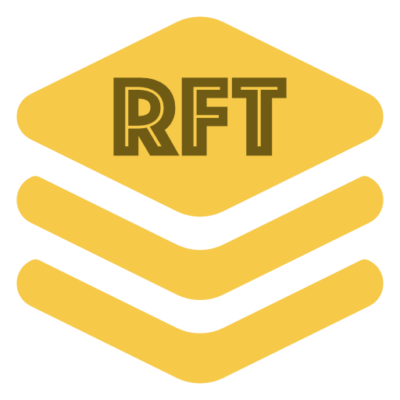


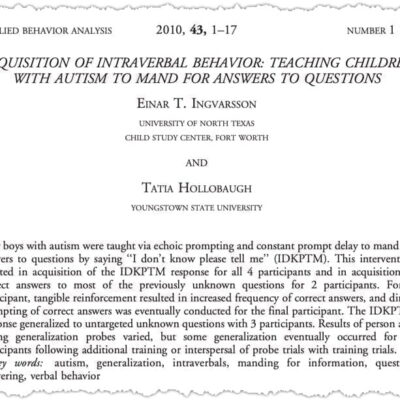
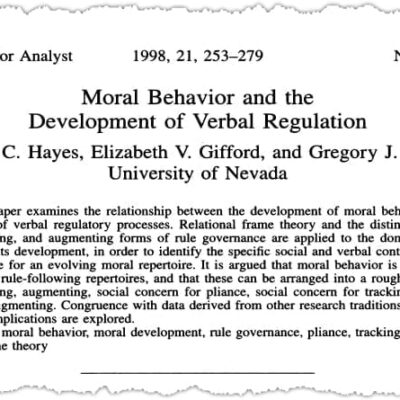
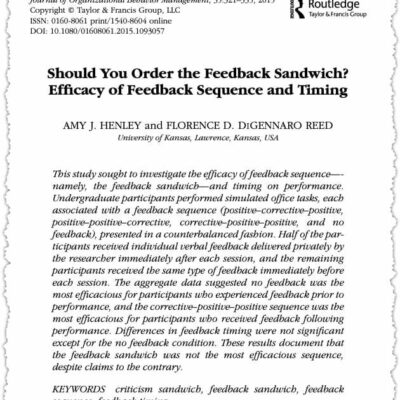
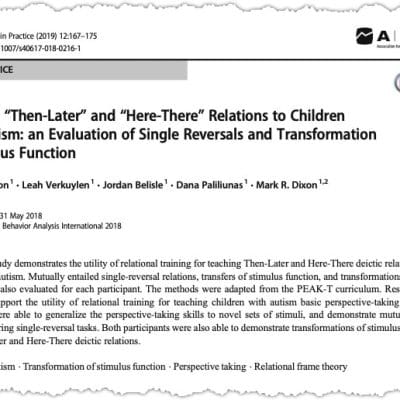

This course was thoroughly a enjoyable, entertaining, and accessible way to learn RFT. I recommend it to all my colleagues and supervisees.
Super enjoyable module that is well structured, fun, fast-paced, informative, and clear! This module is laced with humor that I think most BCBAs would enjoy. Everything is broken up into small chunks with tons of active student responding incorporated within to keep the pace fast and engaging. I was actually a little sad when it was over!
Loved the layout of this course. The self paced modules were advantageous . I understood all the concepts and recommend this CEU to all my friends.
If you’re looking for a great introduction to RFT like the description says, this is a great place to start. I was already familiar with RFT, but the concepts that it taught in this covered were the ones that RFT is made up of. I thought they were very well explained and enjoyed the layout of this module. It was very informative and though there was a lot of information, it was made easily relatable. This is a great introduction module.
I have a far greater understanding of the concepts of RFT from this presentation. The examples were easy to understand and numerous enough to build upon difficult ideas. This is a must-do CEU opportunity.